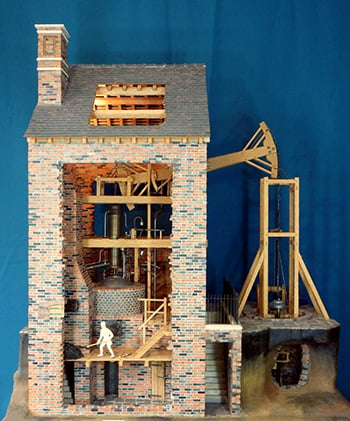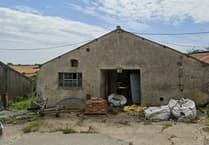David Hulse (85) from Staffordshire has meticulously built nine steam engines, eight of which he has donated to Dartmouth Museum.
David chose Dartmouth as it was the home town of the constructor of the very first commercial steam engine, Thomas Newcomen in 1712.
This engine was used to pump flood water out of a coal mine in Tipton.
David takes up the story: “These industrial engines pre-dated the first steam locomotives by almost a century and Newcomen is an unsung hero.
“Thomas Newcomen was a Baptist as were the owners of the colliery in south Staffordshire so it was a gathering of like-minded people.
“It wouldn’t have worked in Devon and Cornwall because there were no coal mines and you needed the coal to power the engines.”
David first started making his models in 1970 and it took around 6,000 hours to assemble each one which are made 1/16th of the full size.
David explained: “When I say I have made everything, I mean everything.
“You will see nails holding floorboards in position.
“I hand forged the nails as nothing on the engines is commercially available.
“I made all the chains and everything is made from exactly what the engineers would have made it from in the 18th century.
The engine houses are built from real miniature bricks and 151,000 ceramic bricks were made on a specially designed machine.

The second model David made was James Watt’s Smethwick engine of 1779 which was used to conserve water on the Birmingham canal system.
“It re-circulated water from the bottom of a flight of six locks to re-feed the canal at the summit.
Watt is often credited with inventing the steam engine but wrongly as it was Newcomen who has that honour.
David has built replicas of other engines by James Pickard, Matthew Wasborough, Francis Thompson, Adam Heslop and Richard Trevithick.
David used to be the Chief Development Engineer for Royal Doulton Pottery Group.
He was a ceramicist and the experienced gained in his work helped him make the highly intricate models.
He said: “ In my time I have invented 17 patents for the pottery process helping to ease various tasks.”
David used to house the collection at his home: “I used to have visitors from around the world, even Russia!”
David paid tribute to his late wife Julie:
“My wife had never enjoyed good health so we didn’t go away on holidays but we did the research together and what you see is the result.
“She was very well read.”
David now enjoys the company of Jenny who was also widowed who helps him with his work and will accompany him for his talk.
David’s presentation will be in the Guildhall in Dartmouth between 6pm and 7pm on Wednesday August 7.
He will also be presenting his powerpoints for all seven engines to the museum which will be available to future generations.
David has written six books which will be on sale on the night and also has his own website:
https://davidhulse.co.uk/





Comments
This article has no comments yet. Be the first to leave a comment.